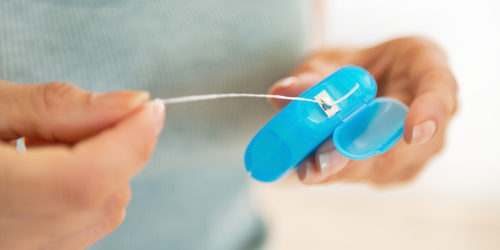The maintenance of oral health is two-fold and is categorized as the efforts to take at home and the work that the dentist performs in the dental clinic. Good oral health is maintained through this combination and not independently. While everyone is encouraged to see their dentists every six months or twice a year, the most critical is what you do on your own, in between those dental appointments.
As part of your personal hygiene measures, one is expected to allot some time to care for the health of their oral cavity. If you want to preserve the health and beauty of your smile, you need to put some effort in cleaning them. This cleaning involves the combination of tooth brushing, mouth rinsing, tongue scraping and flossing.
The Role of Flossing
Many would argue that flossing cannot ensure good oral health and the complete absence of dental caries. That is true, of course, so people are claiming that they have been tricked into believing that it is key to good oral health. But what they fail to realize is that “brushing”, alone is not the answer too. If you want to preserve the health and beauty of your pearly whites, you have to devote more to it. Let us understand what each procedure does:
- Brushing cleans the surfaces of the teeth. If done correctly, you can rid the teeth and gums of adherent plaque that collects on the surfaces of the teeth with the sweeping action of the bristles.
- Rinsing with mouthwash not only freshens your breath but depending on the formulation, it can promote gum healing and can soften hardened plaque so that you can remove it quickly.
- Tongue scraping, done either with a brush or a scraper, removes adherent plaque that has accumulated on the surface of the tongue. A carpet forms on the rough surface of the tongue, and by rinsing you can soften it, so you can scrape it with ease.
- Flossing allows you to penetrate areas in between teeth that the bristles cannot access. When food gets stuck or when plaque adheres in the between the teeth, you can remove it by flossing through every proximal contact.
- Oral Prophylaxis, which is performed in the dental office, is meant to remove accumulated plaque that you are unable to remove with your daily routine. Even the most brilliant effort fails to keep the mouth a hundred percent plaque-free, so the effort of the dentist is valuable in this sense.
So yes, flossing alone, cannot guarantee anything, but it is not an additional activity. In fact, to ensure the optimum oral health, make sure to commit to the two-fold process. That is to see your dentist every six months and to be vigilant in your personal efforts at home. That means that apart from brushing, rinsing, scraping and flossing, you are also watching what you eat.








